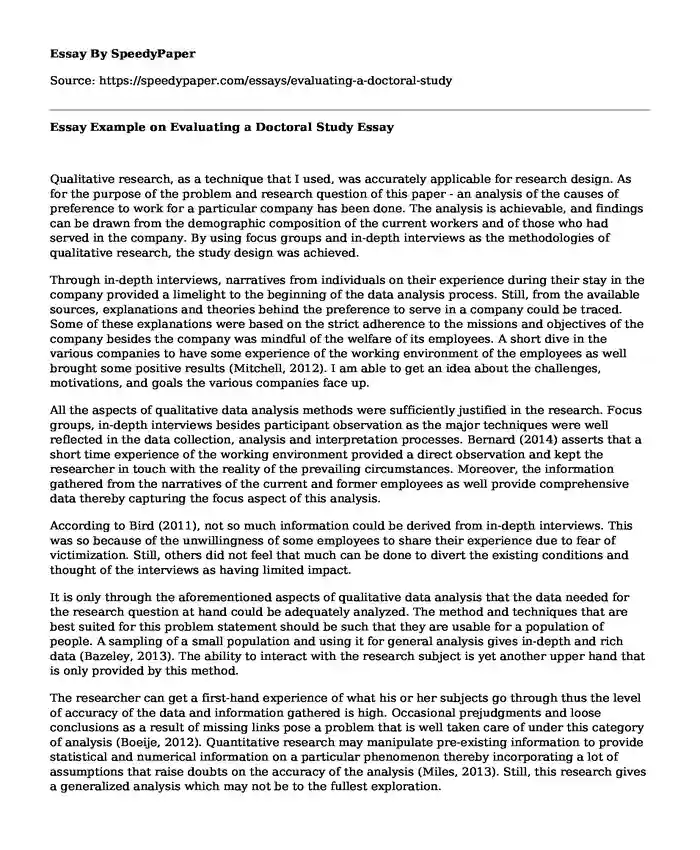
| Type of paper: | Essay |
| Categories: | Sociology Data analysis Research |
| Pages: | 3 |
| Wordcount: | 605 words |
Qualitative research, as a technique that I used, was accurately applicable for research design. As for the purpose of the problem and research question of this paper - an analysis of the causes of preference to work for a particular company has been done. The analysis is achievable, and findings can be drawn from the demographic composition of the current workers and of those who had served in the company. By using focus groups and in-depth interviews as the methodologies of qualitative research, the study design was achieved.
Through in-depth interviews, narratives from individuals on their experience during their stay in the company provided a limelight to the beginning of the data analysis process. Still, from the available sources, explanations and theories behind the preference to serve in a company could be traced. Some of these explanations were based on the strict adherence to the missions and objectives of the company besides the company was mindful of the welfare of its employees. A short dive in the various companies to have some experience of the working environment of the employees as well brought some positive results (Mitchell, 2012). I am able to get an idea about the challenges, motivations, and goals the various companies face up.
All the aspects of qualitative data analysis methods were sufficiently justified in the research. Focus groups, in-depth interviews besides participant observation as the major techniques were well reflected in the data collection, analysis and interpretation processes. Bernard (2014) asserts that a short time experience of the working environment provided a direct observation and kept the researcher in touch with the reality of the prevailing circumstances. Moreover, the information gathered from the narratives of the current and former employees as well provide comprehensive data thereby capturing the focus aspect of this analysis.
According to Bird (2011), not so much information could be derived from in-depth interviews. This was so because of the unwillingness of some employees to share their experience due to fear of victimization. Still, others did not feel that much can be done to divert the existing conditions and thought of the interviews as having limited impact.
It is only through the aforementioned aspects of qualitative data analysis that the data needed for the research question at hand could be adequately analyzed. The method and techniques that are best suited for this problem statement should be such that they are usable for a population of people. A sampling of a small population and using it for general analysis gives in-depth and rich data (Bazeley, 2013). The ability to interact with the research subject is yet another upper hand that is only provided by this method.
The researcher can get a first-hand experience of what his or her subjects go through thus the level of accuracy of the data and information gathered is high. Occasional prejudgments and loose conclusions as a result of missing links pose a problem that is well taken care of under this category of analysis (Boeije, 2012). Quantitative research may manipulate pre-existing information to provide statistical and numerical information on a particular phenomenon thereby incorporating a lot of assumptions that raise doubts on the accuracy of the analysis (Miles, 2013). Still, this research gives a generalized analysis which may not be to the fullest exploration.
References
Bazeley, P. (2013). Qualitative Data Analysis: Practical Strategies. Monterey: SAGE Publications.
Bernard, H. R. (2014). Analyzing Qualitative Data: Systematic Approaches. Mexico: SAGE.
Bird, K. (2011). Computer-Aided Qualitative Data Analysis: Theory, Methods and Practice. Huachuca: SAGE.
Boeije, H. R. (2012). Analysis in Qualitative Research. Beijing: SAGE.
Miles, M. B. (2013). Qualitative Data Analysis. New York: SAGE.
Mitchell, M. L. (2012). Collecting Qualitative Data: A Field Manual for Applied Research. Baltimore: SAGE.
Cite this page
Essay Example on Evaluating a Doctoral Study. (2017, Jul 17). Retrieved from https://speedypaper.net/essays/evaluating-a-doctoral-study
Request Removal
If you are the original author of this essay and no longer wish to have it published on the SpeedyPaper website, please click below to request its removal:
- Paper Example: Frameworks to Mitigate the Shortcomings of Current QoS Technologies
- Free Essay Sample on Basketball on Paper by Dean Oliver
- The American Dream Essay Example
- Free Essay: A Freedom Rider Headed to New Orleans in 1960
- Essay Example on Sexual Assault, Domestic and Family Violence in Australia
- Free Essay on Cultural Intelligence, Emotional Intelligence and Emotional Control
- Free Essay Example - Welfares of Oil Boring
Popular categories




